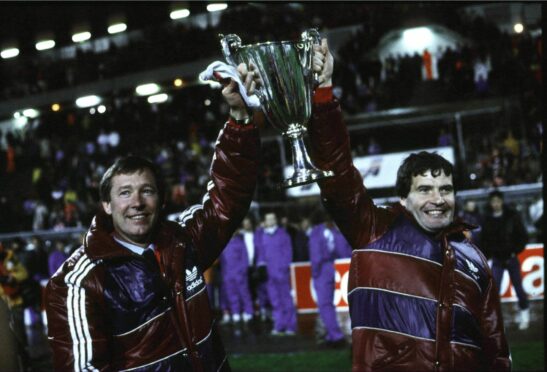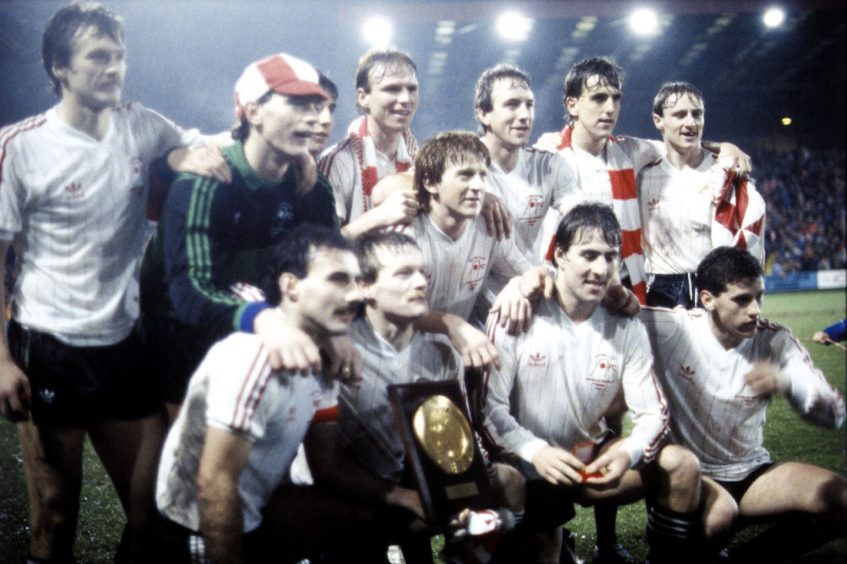Archie Knox believes one of the key factors in Sir Alex Ferguson’s success at Aberdeen was to treat complacency as the enemy.
It is 40 years ago to the day the Dons navigated their first hurdle on their path to winning their second European trophy – the Super Cup.
A battling goalless draw at European Cup winners Hamburg meant it was advantage Aberdeen as they returned to the Granite City.
The Dons went on to win the second leg at Pittodrie a month later thanks to a 2-0 win over the Germans.
But Knox, Ferguson’s trusted lieutenant from 1980 to 1983, and again from 1986 onwards to Manchester United until 1991, insists Ferguson refused to rest on his laurels or take any game for granted.
He said: “Felix Magath was captain of the Hamburg team and he was a super player. Their right back Manny Kaltz was a top player too and we knew it was going to be a tough game.
“The first leg was a tough shift out in very difficult conditions not too different from what we had faced against Real Madrid in the Cup Winners’ Cup final.
“It wasn’t backs-to-the-wall stuff or anything like that but even though it was 0-0 and we had home advantage there was no talk of us being favourites from the manager.
“I don’t think there was ever any circumstances you ever felt like that in a game we played. Even in league games he was the same.
“As far as he was concerned you had to earn the right to win every game you played.
“There was never a situation where the players took to the field thinking ‘we’ll beat them no bother today.’
“Alex had it drummed into them. No win came naturally and you had to do all the basics in the game and do them well to win.
“It was the same when we played Real Madrid earlier that year. There was confidence but never once did he take anything for granted.
“Alex told me he had watched Madrid and felt we had a great chance of beating them but then warned me not to tell any of the players that.
“That’s how he approached everything.”
‘Alex was a master of psychology’
Ferguson’s tactical brilliance also shone throughout his trophy-laden career but Knox believes the players at Pittodrie during his reign were exemplary in following their manager’s instructions.
He said: “Alex was a master of psychology. I’ve never known anyone better at getting the best out of every player.
“He gave players tasks to do in the game along with whatever these lads could offer themselves.
“Each individual player was given a job to do.
“Tactically, Alex would talk to the players about the importance of tracking back and making sure they were in front of their opponent and blocking their way to goal as quickly as they could.
“When you think about that today, every club does it now. “
Leaving the Dons for Dundee was not an easy decision to make
The build-up to the first leg had been fraught with Rangers making an approach to the Dons for their manager.
Ferguson opted to stay at Pittodrie but there would be a sting in the tale in the build-up to the second leg following the shock news Knox had accepted the chance to manage Dundee.
For Knox, 76, the decision to walk away from the Dons was a difficult one.
He said: “It was only a few weeks before the first leg that Alex decided to stay at the club following interest from Rangers which gave everyone a lift.
“We followed our usual routine of watching them while we focused on our league games and it was just a few days before the second leg when Dundee approached Alex for permission to speak to me after Donald Mackay had left the club.
“It was a tough one for me. During my days at school I was a Dundee supporter and went to all their games with my father.
“We’re talking about the period when they won the league in 1962 and reached the semi-final of the European Cup the following season and I was at all those games.
“There was an emotional pull there and it was not an easy decision.
“I’d grown up watching the likes of Bobby Wishart, Alan Cousin, Alex Hamilton, Pat Liney and Hugh Robertson and all these guys back then.
“At the time Dundee showed an interest in me I was at a stage in my career where I’d been part of a club which had won the Cup Winners’ Cup, the league and the Scottish Cup.
“But there was part of me which felt as if I was going to go on and be a manager then this was an opportunity I had to take.”
Aberdeen’s class of ’83 would be worth millions today
Knox will join the Aberdeen squad on Friday to celebrate the 40th anniversary of their Super Cup victory to round-off a year of celebrations.
Beating Real Madrid in the European Cup Winners’ Cup to win a European trophy in 1983 was special.
Winning two was the realms of fantasy but Knox is proud to have been part of a group which delivered unparalleled success in Aberdeen’s history.
He said: “When you look back now it’s ridiculous what that team achieved. It’ll never be done again.
“But honestly, when you think of the team – what would you get for those lads today?
“Put that team up for sale now and it would be millions upon millions. That’s the best compliment I can pay them.
“You have people like Willie Miller, one of the best penalty box defenders ever. Put him on the halfway line and ask him to run back and it might not have been his strong point.
“But when it came to danger in the penalty box you could guarantee Willie would make a block or win a header.
“That whole period was remarkable. It’s a phenomenon what was achieved and we’re still the last team to beat Madrid in a European final all these years later. It’s absolutely incredible.”





Conversation